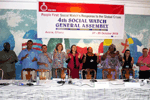|
Social Watch defines new strategy in its Global Assembly
|

The Coordinating Committee
elected in Accra, 2009.
(Photo: Social Watch)
|
Social Watch will define its strategy for the next years in its Global Assembly, which will bring together next week in Manila, Philippines, the diverse membership of the network. Representatives designated by national coalitions from over 70 countries of all continents will participate: women groups, human rights activists, unionists and campaigners for social justice. During three days, they will be discussing the new challenges brought about by the global crises and the civil society responses to it.
Read more
|
South Korea: Top chaebols see affiliates mushroom
The number of affiliates of South Korea’s 15 largest chaebols has increased about 65 percent over the past four years, as those huge family-run business conglomerates have aggressively expanded their territory in the construction and real estate industries, reported this week the civic group Citizens' Coalition for Economic Justice (CCEJ, focal point of Social Watch).
Read more
India: Government sees less poor people by redefining poverty
The new figures set by the Indian government to define poverty (an income of USD 0.45 a day for urban people and one of 0.33 for those living in rural areas) are “abysmally low”, wrote Himanshu Jha, the national coordinator of Social Watch India, in his most recent column for The New Indian Express, one of the major newspapers of his country. The politics fixed according to these indicators can exclude “a large section of the population” that needs aid from “the available social security net, which in this country is minimalist by any standard,” he warned.
Read more
Spain: Traditional parties encourage racism and xenophobia
Racism and xenophobia have intensified in Spain under the influence of political forces and traditional parties that have assumed postulates until now restricted to the extreme right, warned the federation of non-governmental organizations SOS Racismo in its latest annual report. In recent months, “a time bomb” has been created, while “the political class fails as a whole; ones for playing the racist game and others for not condemning it enough”, said Alba Cuevas, the spokeswoman for the network in Cataluña.
Read more
Egypt: Provisional governments should not accept IFIs' conditionalities
Egypt's government decided not to borrow from the IMF, and the Arab NGO Network for Development (ANND) warned that conditions attached to lending by development banks --as liberalisation of trade, investment and deregulation advocated by the US and the EU-- had contributed to the current unrest in the Arab world, reported the British newspaper The Guardian.
Read more
Campaign to create a UN panel of experts on crisis and development
Many civil society organisatiosn have been working on the establishment of an “Ad hoc panel of experts on the world financial and economic crisis and its impact on development”, which was a proposal first made by the Stiglitz Commission at the UN Conference on the financial crisis and later by the Group of 77, representative of the developing countries. They are calling on non-governmental organizations from all over the world to sign an open letter to reinforce the request, that is going to be discussed at the upcoming deliberations of the UN Economic and Social Council (Ecosoc) in Geneva.
Read more
Dialogue Alliance Sud-Nestlé on Colombia
For five years, non governmental organisation Alliance Sud and swiss food multinational Nestlé have been engaged in a high-level dialogue which is innovative in more than one respect. Alliance Sud, focal point of Social Watch in Switzerland, has led two fact-finding missions into Nestlé’s operations in Colombia. These have produced concrete improvements, although the basic conflict between the multinational and trade unions remains.
Read more
Palestinians civil society condemns Greek ban on Freedom Flotilla
The Palestinian Non-Governmental Organizations Network (PNGO), which represents hundreds of civil society organizations and is a focal point of Social Watch, condemned in a statement issued this Saturday the Greek government decision of banning a ship travelling with the Freedom Flotilla II from sailing to Gaza, describing it as “unfortunate.”
Read more
Argentina: Indigenous Community “La Primavera” elected representative
On June 25, members of the Toba-Qom indigenous community “La Primavera” of Formosa held an unprecedented event: the election of its representative before the national government and provincial authorities. The Centre for Legal and Social Studies (Centro de Estudios Legales y Sociales, CELS), focal point of Social Watch, participated as supervisor in this process, which resulted in the election of Félix Díaz.
Read more
